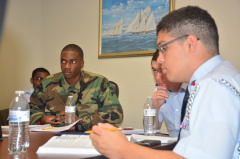Staff Sections
Main Content
Raleigh Wake Senior Conducts Ground School for NCWG Cadets
Cadets taking notes and listening to Maj Browner during his Ground School class. PHOTO CREDIT: Lt Col Lisa Armour, CAP (click image to view full size)
Cadets work towards their pilot licenses
2/8/2017–RALEIGH, NC–When attending different Civil Air Patrol events, Major Jeremy Browner had the opportunity to talk with cadets about flying. Through those conversations, he found out that there are cadets who not only want to learn how to fly, but they also want to obtain their pilots license. During additional conversations, he discovered that one of the major factors holding the cadets back from obtaining their license is the cost of ground school and flying lessons. Major Browner, a certified flight instructor, decided that he could assist these cadets by teaching the ground school himself.
After researching course materials and costs, Major Browner was able to find approved material that he could use. The material is provided by the Federal Aviation Administration (FAA) that he is allowed to download. He decided that his time for teaching the class would be donated to the cadets. This is allowing the cadets to take this class at no charge.
The class started meeting on February 8th on Wednesday nights for 2 hours starting at 6:30 pm at the Lerner Jewish Community Day School in Durham. The class is open to both Cadets and Seniors. Cadets come from several different squadrons in the area. One cadet travels 1-½ hours one way just to attend the class while another cadet travels an hour one way. Most of the other cadets are from the local area.
When asked why they were taking the class, there was a lot of variety from the cadets. One cadet wanted to get his pilots license and into the Air Force Academy. Another cadet watched footage of a rocket going into space and now his dream is to fly into space. One cadet has dreamed of becoming a pilot for as long as he can remember. There are a couple of cadets who have family members who are pilots. The one reason that they all agreed on was the fact that it was free to take the class.
The most surprising information the cadets have learned in the class is that there are numerous ways to crash an airplane. They learned the importance of understanding wake turbulence and hypoxia, especially in how they can affect you and your ability to fly your aircraft. Flying makes you pay attention to detail - miss one little detail and you could crash your airplane. The cadets also found it surprising how many regulations there are to fly and how strict those regulations are. All were surprised by how much of the French language is used in weather. Finally, they acknowledged that they were surprised by all the planning that is required in order to go flying for even one hour.
When asked what their long term goals where, they had some surprising answers. Two obvious ones are to become a general aviation pilot while another wants to become a commercial pilot. One cadet had both his grandfathers serve in the Army Air Corp during World War II and eventually in the Air Force. One of the grandfather’s was a pilot in the P51 Mustang. The other grandfather was an instructor pilot in a bomber. He wants to eventually become an Air Force Pilot and follow in his grandfathers' footsteps. The most surprising and inspirational comment was from the cadet who wants to find and restore older aircraft, especially war birds.
Is this class an important one for our cadets? Yes it is. It is important for any cadet that wants to get their pilots license. It is also an example of the positive effect we have on our cadets. You never know who you might affect or how. Or even who you may be impacting by helping their lifelong dream come true. When you work with cadets, you are helping shape and impact not only CAP's future, but the individual's as well. We can all think of individuals who have impacted us as youth. As adults, we have to realize and understand that we may be making an impression or impacting a cadet, even if we don’t realize it. Remember that and always strive to make a positive impact on all youth, and people in general, that you meet.
Sub Content
- My Account
- Member Login
- Register for an account
Search
- Recent Articles
- Cunningham Field Composite Squadron Hosts Air Operations Training and Familiarization
- NC Wing CyberPatriot Preliminary State Award Winners Announced
- Tar River Composite Squadron Cadets Compete in CyberPatriot Competition
- Civil Air Patrol Remembers Veterans for Christmas
